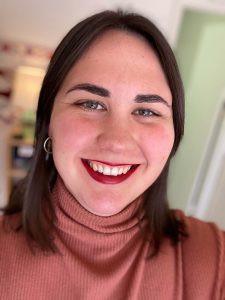 Elizabeth Youatt continues in Penn State’s Developmental Psychology doctoral program. Her central research interest is in personalizing psychiatric risk prediction, assessment, prevention, and treatment. Her primary mentor is Dr. Koraly Pérez-Edgar.
Elizabeth Youatt continues in Penn State’s Developmental Psychology doctoral program. Her central research interest is in personalizing psychiatric risk prediction, assessment, prevention, and treatment. Her primary mentor is Dr. Koraly Pérez-Edgar.
Elizabeth has created and sustained an interdisciplinary research program to better understand how cross-species individual differences in early temperament and biological systems act as etiological mechanisms for anxiety. Her research program involves working in three separate labs with Dr. Koraly Pérez-Edgar in psychology, Dr. Sonia Cavigelli in biobehavioral health, and Dr. Vishal Singh in nutrition. She has focused her research on behavioral inhibition (BI), a trait observed in both humans and animal species and strongly associated with anxiety in children and adults. By doing so, she hopes to develop a more comprehensive understanding of BI and its longitudinal progression. Elizabeth received her master of science in developmental psychology at Penn State in 2020. As a graduate student, Elizabeth received Honorable Mention on a National Science Foundation Graduate Research Fellowship Award. She also received a Translational Research Training Fellowship from the Penn State Clinical and Translational Science Institute. She has three first-author publications, five first-author conference presentations, and three first-author posters. She has research appointments in both Dr. Pérez-Edgar’s Cognition, Affect, and Temperament Lab and Dr. Cavigelli’s Behavioral Neuroendocrinology Lab. Elizabeth received her bachelor of science in psychology at Washington State University in 2016. As an undergraduate, she was also a full-time research assistant in three different labs, simultaneously.
The Strumpf Scholar Award will allow Elizabeth to obtain further training, communicate scientific practices and findings, and collect pilot data to prepare for her dissertation work. The benefits from this award combined with her education will help prepare her for her long-term goal of leading an interdisciplinary research team in her own lab and connecting communities with better health outcomes.